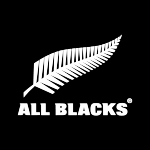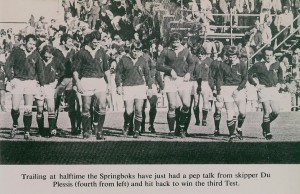 The words of Irish international Fergus Slattery echoed perhaps best the general feeling about South African rugby at the end of the 1976 tour. Commenting to Phillip Jones of the Sunday Times before he left South Africa Slattery said: “The first thing I would tell a young player is not to play like the Springboks. They are five years behind the times.”
The words of Irish international Fergus Slattery echoed perhaps best the general feeling about South African rugby at the end of the 1976 tour. Commenting to Phillip Jones of the Sunday Times before he left South Africa Slattery said: “The first thing I would tell a young player is not to play like the Springboks. They are five years behind the times.”
Five years behind the times was probably a harsh statement considering that the Springboks scored some really good tries in the first test and that they did try and play a more open game in the second test. There were moments in the second and fourth tests when the Springboks really constructed some excellent running rugby. The pressure of winning culminated -after the defeat in the second test – in a safety first approach and a heavy reliance on the exceptional kicking skills of Gerald Bosch.
I would bet my bottom dollar that any other nation, including Ireland and New Zealand, who had a player like Gerald Bosch, would have done the exact same thing in order to secure a series win. One only has to go back to the history books to see how New Zealand did it when they had players like Don Clarke and Grant Fox while Ireland did it when they had players like Tony Ward and Ollie Campbell.
No one can deny, however, that the rugby played in this series was a bit dull and ultimately disappointing from a spectator’s viewpoint. The magnitude of dubious referee decision also left the more knowledgable South African rugby fans with an unsatisfactory uneasiness about South African rugby, the tour, and the controversial manner in which the series win was accomplished. It was hard to celebrate a series win confounded with so many hard to defend incidents. Victory itself is simply not enough; the true South African rugby lover cares and worries as much about how the Springboks win.
In cold statistics the tour was a sweeping success but there was much to ponder about after a very unhappy bunch of Kiwi’s got on the plane and left for New Zealand. No matter how one tried to argue for poor sportsmanship -as reason for the Kiwis whining- in our hearts of hearts all South Africans knew the unhappiness resulted from the manner in which they lost and not because they lost. Ongoing racial issues in the beloved country, the on- and off-field fighting and aggression combined with the manner in which we won left most supporters with very few fond memories about the tour.
Certainly, the ’76 Springboks did not produce heroes like Mannetjies Roux, John Gainsford, Joggie Jansen, Ian McCallum, Frik du Preez, Gert Muller, Syd Nomis, Piet Greyling, Jan Ellis, Johan Claassen and Keith Oxlee as was the case during the tours of 1960 and 1970. Morné du Plessis and probably Moaner van Heerden and to some extend Boland Coetzee were perhaps the only Springboks who stepped out of the tour with an enhanced reputation the rest were pretty ordinary.
In the final analysis Morné du Plerssis had a greater impact on the series than Gerald Bosch. Du Plessis was, in retropective, the difference between the two teams. Not only was du Plessis the Captain-coach but he made some courageous decisions during the series that panned out to be crucial. Du Plessis, having given away an intercept try because of a foolish pass in the first test, had the presence of mind to keep his head clear, and not succumb to the emotional pressure. He had the courage, nerve, and judgment to instruct a change of tactics.
The Springboks were struggling in the lineout and not dominating in the scrums -like they thought they would- and Bosch was off his game -playing with flu- so Du Plessis made a clever but very courageous decision to start running the ball.
Due to that change of tactics, the brilliance of Germishuys was utilised by means of a skillful backline manoeuvre and the weakness of NZ first five eighth, Duncan Robertson playing out of position at fullback, was exploited (See the Germishuys try here).
The Springboks 2nd try in the first test (Krantz’s try – see the try here) was also a result of that change of tactics. In many ways it was an even better try than the Germishuys try. The Springboks took the ball right, left and right again stringing phases after phase with some good rucking and driving. An excellent contructed try by all accounts.
The obsession with “not losing” produced a huge, cumbersome lock on the flank for the last test and the selecetors persisted with Bosch on flyhalf, whose goal kicking in the series was not at all on par with his normal high standards. Gavin Cowley, by far the most polished No10 in the country for the previous three seasons, and who could have ignited and lifted the likes of Oosthuizen, Whipp, Germishuys and Pope to stardom, were ignored in spite of the fact that Cowley proved himself a more than adequate goal kicker.
It is easy to sit on the sideline and critize but du Plessis and the Springbok selectors had to make some serious decisions after the attempt to run at the All Blacks backfired on them in the second test. It would have been criminal to lose a test series trying to run the ball against the best oppostion in world rugby while you had the freakisly talented Gerald Bosch at your dispossal. They opted for size in the pack and with sticking with a well proven recepy and it produced the desired results with some help from the referee one have to add. Imgine the outrage if they went the other way and failed. You just can’t please all the people all the time; sometimes you have to trust your gut and go with that which is what the slectors and du Plessis did in this series. The decisive moment ot turning point in the series came for some scribes when the Springboks selcetors finaly got it right and selected iron man Johan Strauss and Kevin de Klerk for the third test. In spite of that the Springboks were trailing at half time -of that third test- but produced a spirited second half performance, to win that test, after a inspiring half-time talk by du Plessis.
The following few paragraphs by Terry McLean is possibly a good way to end my story about the ’76 tour:
John Stewart’s animadversions upon South Africa and South African Rugby, delivered when the All Blacks returned to Auckland 92 says after they had left it, caused offense to the New Zealanders’ host.
Experience in sporting life teaches one lesson: when you have been beaten, bite the bullet. After Dr Danie Craven returned to Stellenbosch from managing the 1956 Springboks in New Zealand, an experience infinitely more searing than the 1976 All Blacks could remotely imagine, perhaps the wisest man world Rugby has ever known, Mr A.F. Markotter, a great coach and an inspired judge of men and their abilities, greeted him from the car. They shook hands. “Well Craven,” said “Uncle Mark”, “what are you going to say about this lot?” He put his car in gear and drove away. “It hit me,” Dr Craven has said over the years, “that there was only one thing I could say. Nothing.” By and large, he has. New Zealand can thank him for this. That was the year New Zealanders went to bed praying that their men could beat those bastards of Boers, one match after the other. In terms of nationalist fervor mounting to hatred, it was the worst tour Rugby has ever known.
There is a fine line between love and hate; between passion and obsession. Next week I’ll start with the tour of 1956 when the fine line got very murky indeed.
Oubaas Markotter widely regarded as the “father” of South African rugby and whom Terry McLean described as probably the wisest man Rugby has ever known.
